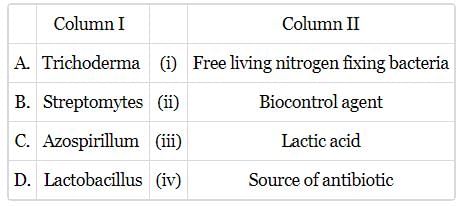NEET Exam > NEET Tests > Test: Microbes as Biocontrol Agents (NCERT) - NEET MCQ
Test: Microbes as Biocontrol Agents (NCERT) - NEET MCQ
Test Description
10 Questions MCQ Test - Test: Microbes as Biocontrol Agents (NCERT)
Test: Microbes as Biocontrol Agents (NCERT) for NEET 2025 is part of NEET preparation. The Test: Microbes as Biocontrol Agents (NCERT) questions and answers have been prepared
according to the NEET exam syllabus.The Test: Microbes as Biocontrol Agents (NCERT) MCQs are made for NEET 2025 Exam.
Find important definitions, questions, notes, meanings, examples, exercises, MCQs and online tests for Test: Microbes as Biocontrol Agents (NCERT) below.
Solutions of Test: Microbes as Biocontrol Agents (NCERT) questions in English are available as part of our course for NEET & Test: Microbes as Biocontrol Agents (NCERT) solutions in
Hindi for NEET course.
Download more important topics, notes, lectures and mock test series for NEET Exam by signing up for free. Attempt Test: Microbes as Biocontrol Agents (NCERT) | 10 questions in 10 minutes | Mock test for NEET preparation | Free important questions MCQ to study for NEET Exam | Download free PDF with solutions
Test: Microbes as Biocontrol Agents (NCERT) - Question 1
Bacillus thuringiensis (Bt) strains have been used for designing novel
Detailed Solution for Test: Microbes as Biocontrol Agents (NCERT) - Question 1
Test: Microbes as Biocontrol Agents (NCERT) - Question 2
Which of the following is not used as a biopesticide?
Detailed Solution for Test: Microbes as Biocontrol Agents (NCERT) - Question 2
Test: Microbes as Biocontrol Agents (NCERT) - Question 3
Which of the following statements regarding baculoviruses as biocontrol agents is/are correct?
Detailed Solution for Test: Microbes as Biocontrol Agents (NCERT) - Question 3
Test: Microbes as Biocontrol Agents (NCERT) - Question 4
A microbial biocontrol agent that can be used to control butterfly caterpillars is:
Detailed Solution for Test: Microbes as Biocontrol Agents (NCERT) - Question 4
Test: Microbes as Biocontrol Agents (NCERT) - Question 5
Baculoviruses (Nucleopolyhedrovirus) do not show
Detailed Solution for Test: Microbes as Biocontrol Agents (NCERT) - Question 5
Test: Microbes as Biocontrol Agents (NCERT) - Question 6
Match column I with column II and select the correct answer from the codes given below.

Detailed Solution for Test: Microbes as Biocontrol Agents (NCERT) - Question 6
Test: Microbes as Biocontrol Agents (NCERT) - Question 7
Which of the following statements is correct with regard to biocontrol agents?
Detailed Solution for Test: Microbes as Biocontrol Agents (NCERT) - Question 7
Detailed Solution for Test: Microbes as Biocontrol Agents (NCERT) - Question 8
Test: Microbes as Biocontrol Agents (NCERT) - Question 9
Integrated Pest Management (IPM) discourages the excessive use of
Detailed Solution for Test: Microbes as Biocontrol Agents (NCERT) - Question 9
Test: Microbes as Biocontrol Agents (NCERT) - Question 10
When a natural predator (living organism) is applied on the other pathogen organisms to control them, this process is called as
Detailed Solution for Test: Microbes as Biocontrol Agents (NCERT) - Question 10
Information about Test: Microbes as Biocontrol Agents (NCERT) Page
In this test you can find the Exam questions for Test: Microbes as Biocontrol Agents (NCERT) solved & explained in the simplest way possible.
Besides giving Questions and answers for Test: Microbes as Biocontrol Agents (NCERT), EduRev gives you an ample number of Online tests for practice
Download as PDF














